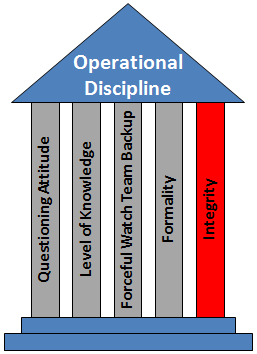 Operational Discipline is doing the right thing, the right way, every time. It is foundational for delivering Operational Excellence and helping companies achieve class leading performance, Integrity, of all the 5 Pillars of Operational Excellence, is the one pillar that has the broadest impact. In this context, we define Integrity as “doing what you say and being dedicated to doing things the right way, whether or not someone is looking.” Operational Discipline is built on 1) knowing what the right thing to do is 2) being willing to always do the right thing and 3) ensuring others always do the right thing. The second point – being willing to always to do the right thing – requires Integrity. You must be willing to follow through and do the right thing and others must be able to rely on you to do the right thing. Knowing how people will behave and what they will do leads to a safer work environment, allows accurate planning, reduces waste, harmonizes activities and drives productivity. Without Integrity, there is no reliability, there is no confidence, there is no trust. And without those things, your employees and your organization will never be Operationally Disciplined.
Operational Discipline is doing the right thing, the right way, every time. It is foundational for delivering Operational Excellence and helping companies achieve class leading performance, Integrity, of all the 5 Pillars of Operational Excellence, is the one pillar that has the broadest impact. In this context, we define Integrity as “doing what you say and being dedicated to doing things the right way, whether or not someone is looking.” Operational Discipline is built on 1) knowing what the right thing to do is 2) being willing to always do the right thing and 3) ensuring others always do the right thing. The second point – being willing to always to do the right thing – requires Integrity. You must be willing to follow through and do the right thing and others must be able to rely on you to do the right thing. Knowing how people will behave and what they will do leads to a safer work environment, allows accurate planning, reduces waste, harmonizes activities and drives productivity. Without Integrity, there is no reliability, there is no confidence, there is no trust. And without those things, your employees and your organization will never be Operationally Disciplined.
Often times when we think of someone acting without Integrity, we think of a person who lies, withholds information, disobeys rules or who is generally unsavory. But acting with Integrity is more than just not doing those things. Acting with Integrity involves actively identifying the right thing to do, communicating what you will be doing, following through on what you said you will do and letting others know as soon as possible if you encounter an obstacle that will prevent you from doing what you said you will do. Looking at Integrity that way, it is easy to see examples where Integrity is lacking, not out of any malicious intent, but because there is not always a consistent focus on Integrity. Did you actually fold the laundry after you told your wife you would? Did you let your friends know you would be late meeting them for dinner when you got stuck at the office? Do you always wait your turn in traffic?
Those might seem like trivial examples, but if you extrapolate them to situations where the stakes are higher and more is at risk, you can see how not acting with Integrity could result in someone getting hurt, sued, fired or worse. On countless occasions as a manufacturing leader I have arranged for individuals or small groups to come in before a shift to finish up special jobs, install equipment, perform changeovers and get jobs set up for the day. Those few times when someone did not show up or was unable to complete the assigned prep work without letting me (or anyone else) know ended up causing serious issues. In fact, one day an entire group sat idle for half of a shift while the equipment installation and changeover that had been planned for prior to the shift were completed during normal work hours. Because one person did not do what he said he would do (come in before the shift started and set up the equipment for that day’s work), our whole group spent the next week catching up on the lost time from that day. You can see how not acting with Integrity can lead to lost productivity, but what if someone says they will fix a piece of unsafe machinery or submit legal documents and they don’t? Or what if they take a shortcut and do it the “easy” way instead of the “right” way? The ramifications could be much more serious than just a few hours of lost production.
Building trust and reliability within an organization depends on everyone acting with Integrity. If you can’t rely on your co-workers to follow through on their commitments and to do the right thing, your company will never exhibit Operational Discipline and achieve Operational Excellence.

